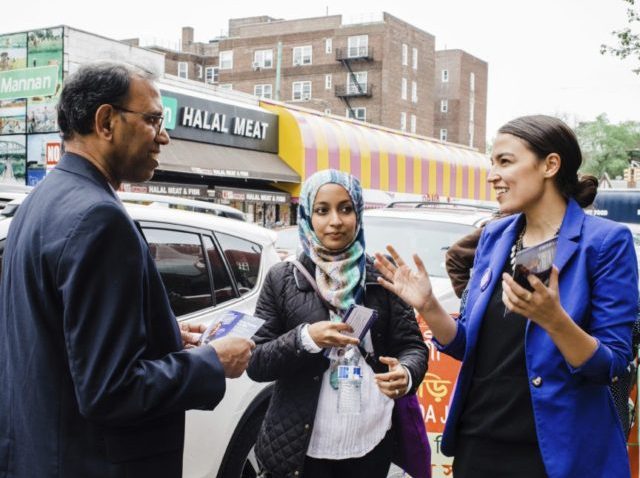The Democratic Party’s activists are picking candidates based on their racial, sexual, and cultural tribes instead of their ideology, the Washington Post admits.
In a June 26 New York primary, Alexandria Ocasio-Cortez defeated Rep. Joe Crowley, the fourth-ranking Democrat in the House, by appealing to voters’ “tribal identities of class, age, gender and ethnicity,” not their ideology, said the Post‘s article.
The article is headlined “The worst thing to be in many Democratic primaries? A white male candidate,” and it continues:
… Democratic voters are increasingly embracing diversity as a way to realize the change they seek in the country.
Given an option, Democratic voters have been picking women, racial minorities, and gay men and lesbians in races around the country at historic rates, often at the expense of the white male candidates who in past years typified the party’s offerings.
The “tribal trend,” said the Post, is driven by “the party’s growing dependence on female and minority voters,” and it has sidelined the expected ideological disputes between left and far-left candidates:
“The ideological part is only a very small piece. There is something deeper going on,” said Simon Rosenberg, a strategist at the New Democratic Network. “In this new social media age of politics, compelling, authentic candidates who can tell positive stories about themselves are succeeding over lifer politicians.”
The paper notes the very different divides in the GOP, where rival candidates champion and compromise rival ideological viewpoints, largely independent of their personal stories, race, sex, origin or lineage:
The closest analog to Crowley’s downfall was Dave Brat’s unexpected 2014 Virginia primary defeat of Rep. Eric Cantor, a Republican leader seen by many as a future House speaker. But that race, between two white men of similar age and background, hinged on the conservative [ideological] dispute over immigration and a determination by voters to upset the ways of Washington.
Unlike tribal Democrats who organize themselves into semi-fixed identity groups, the conservative GOP conserves the classical intellectual ideals built into the U.S. Constitution, and which aspires to help all people compromise on their voluntary political differences, regardless of color, sex, creed or tribe. According to the libertarian Mises Institute:
“Classical liberalism” is the term used to designate the ideology advocating private property, an unhampered market economy, the rule of law, constitutional guarantees of freedom of religion and of the press, and international peace based on free trade. Up until around 1900, this ideology was generally known simply as liberalism …
[Recent U.S.-style] social liberalism deviates fundamentally … it denies the self-regulatory capacity of society: the state is called on to redress social imbalance in increasingly ramified ways.
The Post article does not clearly define “diversity,” even though it uses the term four times. For example, it says “Democrats generally place a far higher value on racial, ethnic and national diversity than Republicans.”
That sentence contradicts the rest of the article because it suggests Democratic voters want a variety of candidates — regardless of the candidates’ actual identities, views, and ideologies. But the rest of the article shows that Democratic voters oppose a wide variety of candidates and instead favor candidates who match their narrow and semi-fixed tribal identity as feminists, Latinos, blacks, “transgenders,” gays, etc.
The Post’s authors may be using the “diversity” word to describe two political extremes — the progressives’ preference for government-imposed civic variety and the Democrats’ various grass-roots, semi-permanent, “tribal” identities.
The progressive, elite-socialist ideology of “diversity” uses government to impose variety on settled, coherent communities with the goal of fragmenting political resistance to progressives’ centralized power. This form of divide-and-rule diversity is aided by the business-backed importation of migrants from incongruous cultures, such as Somalia and El Salvador, Islam and Christianity, or Indian universities and Central American farms.
U.S. conservatives oppose the centralized variety of “diversity” and the grass-roots variety of semi-fixed tribalism.
Conservatives instead favor a small-government ideal which allows a shifting mix of personal freedoms and voluntary affiliations. They expect people — regardless of race, class, sex or birthplace — to organize themselves and their ideas to meet their own needs, be it a local soccer league or a new political party, a pool party for youths or safe suburbia for families, or high-tech development and low-tech welfare.
Read the Washington Post article here.

COMMENTS
Please let us know if you're having issues with commenting.